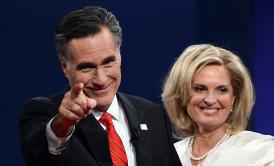Let no one doubt New Jersey Gov. Chris Christie again. He went offscript last weekend, predicting that the narrative of the race would change Thursday morning. And lo and behold, he was right. At least for a little while, the chattering class will put a pause on all the talk about how Mitt Romney is falling behind in the polls to talk about how he managed to beat President Obama at the podium. Romney went on the offensive, forcing the president, who looked none too happy to even be there, to defend his policies. And perhaps most perplexing of all, Obama failed to mention the infamous 47-percent remark and Bain Capital, two issues that his campaign has been hammering home for months. Let’s take a look at some commentary.
Obama, like other presidents before him, “fell victim … to high expectations, a short fuse, and a hungry challenger,” writes the National Journal’s Ron Fournier. “Romney smiled and cracked jokes … Obama smirked.” It seems commentators didn’t need to watch until the end to come to that conclusion. Buzzfeed’s Ben Smith called the debate for Romney some 40 minutes in, saying the Republican’s “core success was that he won by not losing.” In Time’s Mark Halperin’s report card, it wasn’t even close. Romney got an A-, while Obama received a B-.
Although Romney may have not offered details about his plans that political junkies wanted, “someone tuning in for the first time, would surely have come away feeling that Romney was the candidate with a firm grasp of what he wanted to do and Obama the guy slightly out of his depth,” points out Bloomberg Businessweek’s Joshua Green. Indeed, writes the New York Daily News’ Joshua Greenman, Romney was “more incisive, more fluid and good-natured through it all,” and managed to be tough “without being vicious or disrespectful.”
Part of the problem was that Obama got on the wrong side of what the Washington Post’s Chris Cillizza calls the “fine line between sober/serious and grim/uninterested.” He seemed to be taking on the same persona that worked for him in 2008 when he was an untested leader and was eager to prove he was ready for the job. “But now that he has been in the job for four years, Obama’s demeanor came across far less well.” The Chicago Tribune throws Obama what might be the ultimate insult, describing him as “that guy at the meeting who’s surreptitiously checking his email.”
Even Democrats were not too impressed with Obama’s debate performance. “Energy and focus all in Romney’s hands on this,” writes Talking Point Memo’s Josh Marshall, pointing out that even though Romney repeatedly “left himself open to wounding hits from the president,” Obama chose to “not go there.”
John Hinderaker at Power Line, a conservative blog, is veritably giddy: “It wasn’t a TKO, it was a knockout.” Romney “was the alpha male, while Barack Obama was weak, hesitant, stuttering, often apologetic.”
There were “no haymaker punches thrown and not much in the way of one-line zingers,” write Steve Holland and John Witesides at Reuters. “Romney, however, may have done himself some favors with crisper answers than Obama, who sounded professorial and a bit long-winded.” What’s undoubtedly frustrating for Democrats is that this was exactly the thing many had warned the president about before the debate.
And what seems to be, so far at least, the pretty unanimous view that Obama lost the debate may hurt him more than how he actually did at the podium. “Much worse for Obamas than the debate is the media’s harsh verdict on his debate performance,” writes the Washington Post’s Ezra Klein on Twitter.
Also in Slate, David Weigel reports from the spin rooms and John Dickerson asks whether Romney can make his newfound momentum last longer than a day.
